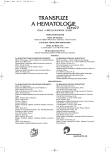-
Medical journals
- Career
Results and complications of splenectomy in patients with severe thrombocytopenia in ITP resistant to initial conservative therapy – centre experience
Authors: S. Vokurka; V. Koza; V. Vozobulová; T. Svoboda
Authors‘ workplace: Hematologicko-onkologické oddělení, Fakultní nemocnice v Plzni
Published in: Transfuze Hematol. dnes,13, 2007, No. 1, p. 23-26.
Category: Comprehensive Reports, Original Papers, Case Reports
Overview
Idiopathic thrombocytopenic purpura is an autoimmune disorder characterized by thrombocytopenia caused by anti-platelet autoantibodies bind to platelets membrane antigens. Corticosteroids represent the first-line treatment and in case of their failure, splenectomy leads to remissions in 60% to 70% of patients. A little data are available on early postoperative course and long-term follow-up in selected group of patients with severe thrombocytopenia prior to splenectomy. Two weeks after splenectomy and during still ongoing immunosuppressive therapy, in a group of 11 corticosteroid-resistant patients with the median number of 4 (0–15) x 109/l thrombocytes just prior to splenectomy, there were 3/11 (27%) patients with no treatment response, in 5/11 (56%) patients early increased thrombocytes fell down again bellow 30x109/l and only in 3/11 (27 %) the number of thrombocytes permanently grew over 30x109/l. With the median follow-up of 50 (0,7–73) months and concurrent immunosuppressive treatment given during the median of 8 (0,7–67) months, one patient with refractory ITP died of bleeding on day 22 post splenectomy, one patient remains therapy resistant and stabile remission was reached in 9/11 (82 %) patients (5/11, 45 % complete remission). Median time from splenectomy to the best therapy-response was 1 (0–27) months and the patients have stayed in remission for 59 (18–70) months, so far. ITP relapsed in 3/9 (33 %) patients after median remission-duration of 32 (31–60) months. In patients with severe thrombocytopenia there were more bleeding complications after splenectomy. Probability of the splenectomy failure, several-weeks lasting severe thrombocytopenia or long-time immunosuppressive treatment necessary to reach stabile remission, must be always considered on splenectomy indication.
Key words:
idiopathic thrombocytopenic purpura, splenectomy, immunosuppression, complications
Sources
1. McMillan R., Durette C. Long-term outcomes in adults with chronic ITP after splenectomy failure. Blood 2004; 104 : 956–960.
2. Kvapil F, Doubek M, Brychtová Y, et al. Splenektomie v diagnostice a léčbě hematologických onemocnění – indikace, komplikace a výsledky jednoho pracoviště. Hematologie a transfuze dnes 2006; 12 : 146–152.
3. Kojouri K, Vesely S, Terrell D, et al. Splenectomy for adult patients with idiopathic thrombocytopenic purpura: a systematic review to asses long-term platelet count responses, prediction of response and surgical complications. Blood 2004; 104 : 2623–2634.
4. George JN, Woolf SH, Raskob GE, et al. Idiopathic thrombocytopenic purpura: a practice guideline developed by explicit methods for the American Society of Hematology. Blood 1996; 88 : 3–40.
5. Penka M, Buliková A, Matýšková M, et al. Normální hodnoty krevního obrazu a koagulace in Hematologie I – neonkologická hematologie. Grada 2001, 191.
6. Beardsley D. ITP in the 21st Century. Hematology 2006; 402 – 407.
7. Cines D., Bussel J. How I treat idiopathic thrombocytopenic purpura (ITP) Blood 2005; 106 : 2244–2251.
8. Geore JN. Idiopathic thrombocytopenic purpura in adults: current issues for pathogenesis, diagnosis and management. Hematol J 2004; 5: S12–14.
Labels
Haematology Internal medicine Clinical oncology
Article was published inTransfusion and Haematology Today

2007 Issue 1-
All articles in this issue
- Therapy of follicular lymphoma - latest developments
- A relationship of serum imunoglobulin free light chain levels measurement to multiple myeloma staging
- Aberrant chromatin regulation as a molecular mechanism of MLL--ENL leukemogenesis
- Results and complications of splenectomy in patients with severe thrombocytopenia in ITP resistant to initial conservative therapy – centre experience
- From the monitoring of Bcr/Abl fusion gene level in patient with chronic myeloid leukemia to the imatinib resistance detection – case report
- Kaposi’s sarcoma after non-myeloablative allogeneic peripheral stem cell transplantation – case report
- Recommendations of the Nurses Association of the Czech Hematologic Society of ČSL JEP on Nurse-Staffing in Hematologic Intensive Care Units and Hematopoietic Stem Cell Transplantation Centers
- Transfusion and Haematology Today
- Journal archive
- Current issue
- Online only
- About the journal
Most read in this issue- Results and complications of splenectomy in patients with severe thrombocytopenia in ITP resistant to initial conservative therapy – centre experience
- A relationship of serum imunoglobulin free light chain levels measurement to multiple myeloma staging
- From the monitoring of Bcr/Abl fusion gene level in patient with chronic myeloid leukemia to the imatinib resistance detection – case report
- Therapy of follicular lymphoma - latest developments
Login#ADS_BOTTOM_SCRIPTS#Forgotten passwordEnter the email address that you registered with. We will send you instructions on how to set a new password.
- Career

